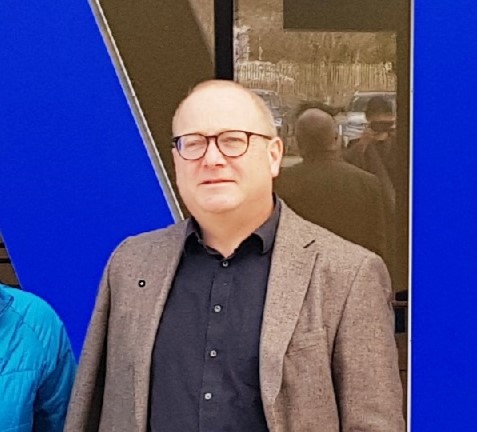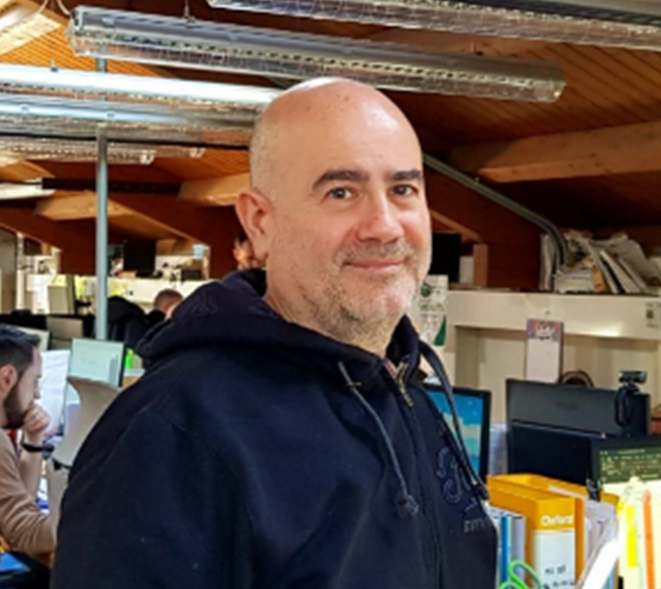
Highlighting contributors to EU-Japan cooperation: Hannes Voraberger and Massimo Esposito
The EU-Japan Centre is happy to present the 5th edition of interviews featuring individuals and organisations making EU-Japan collaboration a reality. In this edition, we introduce the stories of European companies participating in our long-run training programme for Japanese students called ‘Vulcanus in Europe’.
Since its establishment in 1996, more than 500 Japanese science & technology university students received a precious, life-changing learning opportunity by working as interns at European host companies through the ‘Vulcanus’ programme. Today, this programme’s alumni form a unique and significant group of young leaders who facilitate EU-Japan cooperation in various fields. This experience is made possible by many European companies who generously welcome the Vulcanus students from Japan into their teams. We greatly appreciate these host companies as ‘contributors to EU-Japan cooperation’.
In this interview, we spoke with Dr. Hannes Voraberger and his colleagues at Austria Technologie & Systemtechnik Aktiengesellschaft (AT&S), and Mr. Massimo Esposito and his colleagues at U-Series S.r.l. in Italy, to hear about their Vulcanus experiences. AT&S attended 3 Vulcanus sessions since 2021 and hosted 5 students, while U-Series S.r.l. attended 2 Vulcanus sessions since 2022 and hosted 2 students.
 |
Dr. Hannes Voraberger, Vice President - Research & Development, at Austria Technologie & Systemtechnik Aktiengesellschaft (AT&S) |
|
|
Mr. Massimo Esposito, Local Manager, U-Series S.r.l. (Italy) |
Q: Can you tell us why your company decided to participate in the Vulcanus programme in the first place?
AT&S (Austria): When we first applied to the Vulcanus programme, it was really about curiosity. We saw this opportunity to host Japanese S&T students and, as we always had good relations with Japan, our supply chains, partners, customers and others, and we knew the engineers in Japan and their skills were great. We thought the Vulcanus programme might give us an ideal next step to engage with Japan further. We were also lucky with our first Vulcanus experience. We applied exactly in the domain where we were initiating a new field of research and the student we hosted was in this field. So was his university - the University of Electro-Communication in Tokyo, which is now one of our partners. Thus, we were able to initiate a collaboration in the field we were seeking. Due to this good first experience, we immediately launched our next Vulcanus application.
U-Series (Italy): Our first motivation was to receive knowledge and to have an exchange, from a cultural and behavioural point of view, with students from a different country. We in fact do not need foreign students to conduct our company’s activities, but bringing in students from different cultures to our team is a great way to have an inspiring exchange that will help our team and company. For this type of exchanges, we believe that young people usually bring the most impressive impact.
Q: How has your experience been as a Vulcanus host company? What merits do you see in this type of programme?
AT&S: First, we feel that the process of selecting students is very good. All the students that we hosted were hard-working and we have not been disappointed. We have been assigning Vulcanus students to different teams on purpose. Taking a student can help a team in various ways but it also requires time to train him or her at first. However, every team we gave a Vulcanus student to so far says we can give them another Vulcanus at any time. One reason why the rate of success has been high is the length of the internship. If it was shorter, the cost for the company would be higher than the benefit. Also, we have not met a single Vulcanus who was not polite. Vulcanus students know how to behave professionally. As for the merits of this type of programme - if we want to be successful, we have to open up to different perspectives. Every culture brings a different way of thinking, and in engineering and technology, the Japanese way is very good. It is not that far from the German way of thinking in technology, and we think it adds good value. In addition, a programme like this is absolutely bridging the cultural and language barriers that we have with Japanese companies and is helping our company in this respect, too.
U-Series: For us the experience has been very good, and the programme was well organised. We did not have any particular difficulty. Our team says that it has been enriching to meet a different country, culture, and perspective by hosting Japanese students and it has been good to get a first-hand experience of Japan.
Q: Your company has played an important role in the development of several Japanese students by hosting them for many months. What do you see in Japanese S&T students as a strength?
AT&S: Their focused way of working, strong education in engineering and technology, and their mindset of quality - quality of how things are done, how things are solved, and proper way of documentation. They showed very good skills. We have experience working with local students in Austria as well as some Asian countries, but the consistent way of working is definitely a strength of Japanese students.
U-Series: Their commitment to work and how they concentrate on work. They are also polite and have respect for their colleagues and the working environment. From a technical point of view, the two Vulcanus students we hosted were excellent and had a wide range of knowledge. They were both bachelor level students, not master level but they had good foundations from their universities.
Thank you Dr. Hannes Voraberger, Mr. Massimo Esposito and colleagues at AT&S and U-Series for sharing your experiences and insights. It was a pleasure talking with you! (Interview held in March 2024)
For the next interview with H.E. André J. Spiteri, the Ambassador of the Republic of Malta to Japan, you can click here.
Curious about the previous interview with Christa De Kemp, the Managing Director of the Dutch and Japanese Trade Federation (DUJAT)? Click here!









